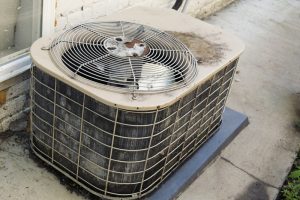Life in Panama City means beaches and ocean breezes. But this environment has some downsides and one of them is the salty air and the corrosive effect it can have on those air conditioning systems that are so vital for keeping you cool through the year.
As Panama City HVAC pros, we know quite a bit about the effect of salty air on ACs. Today we’re going to give you the vital information you need to protect your home cooling.
Understanding the Impact of Salty Air on Your AC
Our coastal air is rich in salt, which can be a problem for metal surfaces, such as in your AC. When salty air is drawn into your AC, the salt particles adhere to the coils and other metal components. Over time, this accumulation can cause corrosion, leading to several issues:
- Corroded coils: The evaporator and condenser coils are crucial components of your AC system. When these coils corrode, their efficiency drops significantly, leading to reduced cooling capacity. Corroded coils can also develop leaks, which can result in the loss of refrigerant—a critical issue that often requires costly repairs.
- Damaged electrical components: The corrosive effects of salt can also extend to the electrical parts of your air conditioner. Corroded electrical connections can lead to malfunctions, resulting in frequent system shutdowns and a shortened lifespan for your AC unit.
- Loss of efficiency: As the metal components in your AC corrode, the system must work harder to maintain your desired indoor temperature. This not only increases your energy bills but also puts additional strain on the unit, leading to more frequent breakdowns.
Signs Salt Air Is Affecting Your AC
It’s essential to stay alert for signs that salty air is taking a toll on your air conditioning system:
- Rust and corrosion: Visible rust on the outdoor unit or any metal components of your AC is a clear sign that salt air is causing damage. If you notice rust on your AC unit, it’s time to take action.
- Drop in cooling power: If your AC isn’t cooling your home as effectively as it used to, corrosion may be the culprit. A decline in cooling performance is often linked to corroded coils or other damaged components.
- Unusual noises: Corroded parts can lead to unusual noises during the operation of your AC. If you hear grinding, rattling, or other strange sounds, it could be a sign that corrosion has affected the internal components of your system.
- Frequent repairs: An air conditioner that requires frequent repairs may be suffering from the effects of salty air. If you’ve noticed an uptick in service calls, it might be time to consider the underlying cause—corrosion.
How to Protect Your Air Conditioner From Salt Air
While you can’t eliminate the presence of salt in the air, you can take steps to minimize its impact on your air conditioning system. Here are some tips to help protect your AC:
- Schedule regular maintenance
- Install a protective coating to the coils and other metal components
- Regularly rinse the outdoor unit
- Trim vegetation around the unit to allow for better airflow
At Peaden, we’re dedicated to helping our customers keep their homes comfortable year-round. Contact us today to schedule your annual AC maintenance or to learn more about how we can help you protect your air conditioner from the challenges of coastal living.

